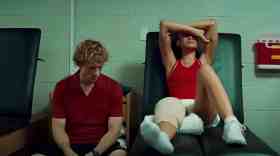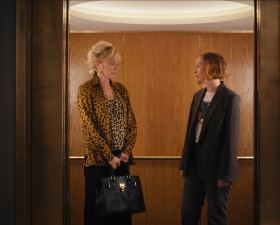While Neil Peplow spoke urgent adult words about integrating the sector with the world around us, the Screen Forever creche was getting started. For many, this was the true symbol of change – some people in his audience were only there because the childcare was available. Image: from Screen Forever.
AFTRS CEO Neil Peplow started his speech at the opening of Screen Forever gently. The school is celebrating its 45th anniversary, was created by mavericks with bipartisan political support, and is focused on creativity.
But, he said, ‘At the moment, it doesn’t feel like creativity is paying our bills in the screen sector. We are constantly having to adapt, to move with the changing models and platforms, and disrupt our own business models to survive.’
One indicator of the enormous changes over the last 45 years is the rise and rise of data.
‘It is no longer gut instinct but data that drives funding decisions. Algorithms, not TV guides, shape audience choice. Data is the new mining boom. Information is invaluable.
I’d like to take some time to go through some data that shows the impact of the digital disruption we are facing. According to PwC Outlook’s report, between 2016 and 2021 the filmed entertainment sector will have only grown by 2.5% worldwide. This is compared to SVOD, which will have grown by 85%.
Recent research illustrates the increasing value of streaming services. In the US, 27% of households have one streaming service, 26% have two streaming services and 11% have three. That is a substantial market, and you can currently see business models pivoting to reflect this.
Of course, all of these changes and challenges will be looked at closely during this conference.
However, I’d like to share with you some other data-related points which are equally, if not more, important.
Diversity is without doubt another challenge facing us. It has become a central theme of these conferences, and rightly so. Let’s look at some of the numbers.
Only 9.9% of feature films that opened in the US between 1988 and 2017 were directed by women. Last year, 94% of the creators of new American shows were white, and 84% were male. Closer to home, Screen Australia’s 2016 report Seeing Ourselves showed that although 32% of Australians have a first- or second-generation background other than Anglo-Celtic, they only represent 18% of the main characters in TV drama. Even though 8% of Australians live with a disability, they represent only 4% of TV characters. Finally, 11% of Australians are of diverse sexual orientation, sex or gender identity, and yet they only see themselves represented by 5% of main characters.
This is something I am passionate about, and committed to changing. We should all be committed to ensuring that the ideas and talent that inform this industry are drawn from all walks of Australian life.
We can’t assume that one set of perspectives can reflect the diversity of contemporary Australia, or that good intentions alone will remove barriers for underrepresented groups. We need to shift the way we think and see the world.
We need to address this to reach the widest number of Australians who watch the ads, pay for the tickets, subscribe to local streaming services and pay their taxes. The people who pay our bills. If we don’t, we will be missing out on reaching a wider audience that will help us find a way to build sustainable businesses. And the diversity dividend is real.
We’ve seen this recently in America with the success of Crazy Rich Asians, with the first Asian-led cast since The Joy Luck Club 25 years ago. It has so far grossed $236 million worldwide, not bad for a film that was first thought to be a specialist movie.
To help us tell our own untapped wealth of stories, AFTRS is publishing an inclusive storytelling resource to help guide the industry on good practice principles regarding authenticity and collaboration. These emerged from the Talent Camp initiative that we are presenting on Wednesday at 10:30am.
At AFTRS, we have started to use data to check that we are moving towards reflecting Australian society. We have set targets for students entering the school, the students who will then become the next generation of storytellers and creative entrepreneurs. These will be published once we have enrolled this year’s students and gather the information.
By gathering the data, we are able to determine the initiatives that are working, and those that are not, in order to learn from the journey. Without good data gathering, we will never know. We will be publishing these stats annually to ensure transparency in the work of the school, and also to share what we have learnt. We encourage others to do the same.
To help us on our journey, we will continue to work closely with the Screen Diversity and Inclusion Network, celebrating our first awards for good practice in diversity and inclusion later today.
We all need to challenge ourselves to ensure that we maintain that maverick spirit and lift our heads up from the ongoing pressures of our work. Collectively, we can effect profound change, generate seismic cultural shifts and work towards building a healthy and thriving industry. And with predictions that video will make up 82% of all internet traffic by 2021, we need to make sure it is not dominated by hate-driven, divisive content that doesn’t reflect the society that we want to live in, and want our children to grow up in.
We have a lot to be excited about. Ideas, IP and connections are the currency of the new cultural economy, and the screen industry is a powerhouse of all these things. Recent data published by the Department of Communication and the Arts valued the creative and cultural industries in 2016 at $111.7 billion, or 6.4% of GDP. Over the past eight years, the sector has grown by 30%.
It is tremendously exciting to be working in this industry, and to be working towards our collective, creative future.’
——–
Thanks to Neil Peplow for permission to reproduce this speech.





